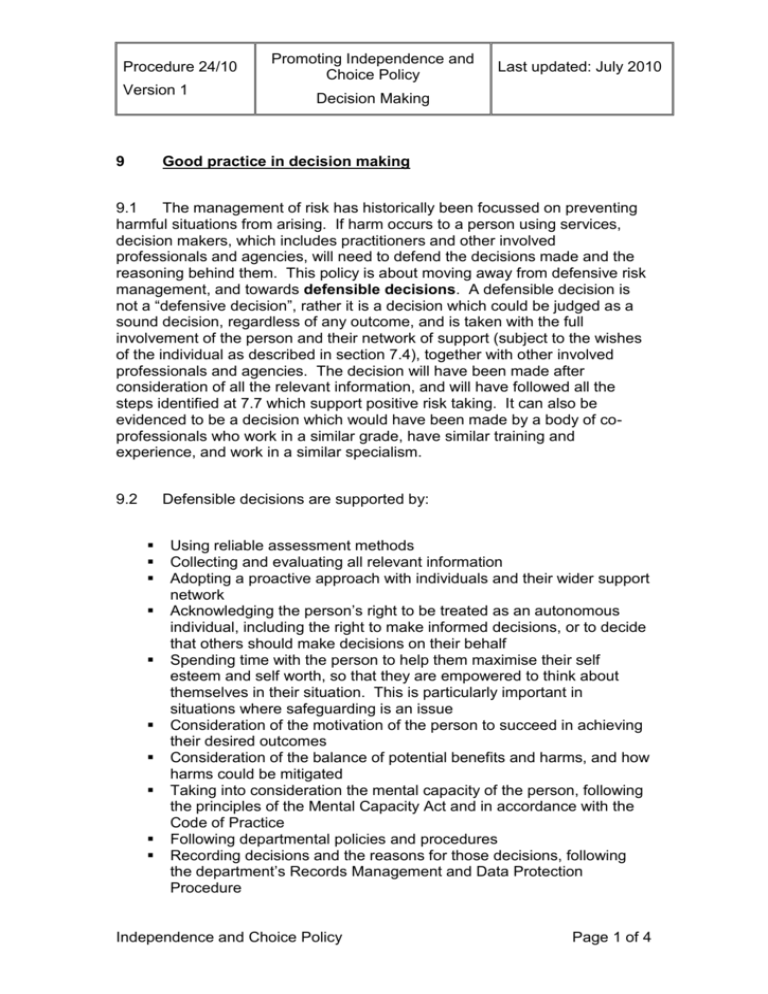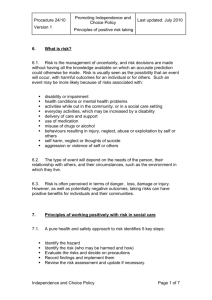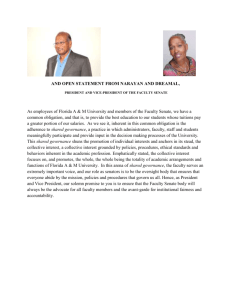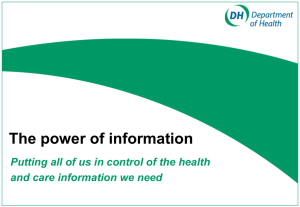Decision making 47kb
advertisement

Procedure 24/10 Version 1 9 Promoting Independence and Choice Policy Last updated: July 2010 Decision Making Good practice in decision making 9.1 The management of risk has historically been focussed on preventing harmful situations from arising. If harm occurs to a person using services, decision makers, which includes practitioners and other involved professionals and agencies, will need to defend the decisions made and the reasoning behind them. This policy is about moving away from defensive risk management, and towards defensible decisions. A defensible decision is not a “defensive decision”, rather it is a decision which could be judged as a sound decision, regardless of any outcome, and is taken with the full involvement of the person and their network of support (subject to the wishes of the individual as described in section 7.4), together with other involved professionals and agencies. The decision will have been made after consideration of all the relevant information, and will have followed all the steps identified at 7.7 which support positive risk taking. It can also be evidenced to be a decision which would have been made by a body of coprofessionals who work in a similar grade, have similar training and experience, and work in a similar specialism. 9.2 Defensible decisions are supported by: Using reliable assessment methods Collecting and evaluating all relevant information Adopting a proactive approach with individuals and their wider support network Acknowledging the person’s right to be treated as an autonomous individual, including the right to make informed decisions, or to decide that others should make decisions on their behalf Spending time with the person to help them maximise their self esteem and self worth, so that they are empowered to think about themselves in their situation. This is particularly important in situations where safeguarding is an issue Consideration of the motivation of the person to succeed in achieving their desired outcomes Consideration of the balance of potential benefits and harms, and how harms could be mitigated Taking into consideration the mental capacity of the person, following the principles of the Mental Capacity Act and in accordance with the Code of Practice Following departmental policies and procedures Recording decisions and the reasons for those decisions, following the department’s Records Management and Data Protection Procedure Independence and Choice Policy Page 1 of 4 Procedure 24/10 Version 1 Promoting Independence and Choice Policy Last updated: July 2010 Decision Making Sharing and owning decisions collaboratively with the person and others whom the person wishes to be involved Taking actions which will mitigate identified risks, while supporting the person to make choices Identifying risks which cannot be managed within the risk assessment Ensuring that support plans meet the assessed needs and achieve the agreed outcomes identified in the person’s assessment. 9.3 If decisions are made in this way, it will be possible to evidence that the decision made was reasoned and justifiable, whatever the outcome. 10 Duty of care 10.1 A duty of care is the obligation placed on an individual or organisation to exercise a reasonable standard of care while doing something, or possibly omitting to do something, that could result in harm to others which could have been foreseen. This means that organisations and individuals must maintain an appropriate standard of care in all circumstances of their work, and ensure that actions taken, or failure to act, does not create or support situations in which people will be harmed, or it is reasonably foreseeable that they will be harmed. 10.2 When people need help from Adult Services the relationship between Adult Services and that person gives rise to a duty of care, however the specific obligations for Adult Services under that duty of care may be different according to the circumstances. For example, if a person lacks capacity to make a specific decision about their social care, then the obligation of the practitioner is to make a best interests decision on behalf of the person, which takes all circumstances into account and considers whether less restrictive options would be able to meet the objectives of the proposed care. The focus of this decision making must be on reducing risk and keeping the person safe, as the person is not able to make this decision for themselves. If however the person has capacity to make this decision, then the obligation of the practitioner is to offer support and information to enable the person to make the decision themselves: this is supported decision making, and the decision the person makes will be the best decision for them, although this may be a decision which may be considered by others not to be in their best interests. 10.3 In practice, the processes involved in reaching a best interests decision and supported decision making are very similar, and are shown in the diagram at Appendix A, page 32. Independence and Choice Policy Page 2 of 4 Procedure 24/10 Promoting Independence and Choice Policy Version 1 Last updated: July 2010 Decision Making 10.4 Where a decision involves support which is provided or funded by Adult Services, then Adult Services must ensure that the support provided is safe, of high quality and is sufficient to meet the person’s assessed eligible needs. A duty of care may also arise to others, for example Adult Services must ensure that the care provided does not give rise to circumstances which may result in harm to carers, care workers or others. In order to support positive risk taking, the balance between the choice and wishes of the person will need to be balanced carefully against the potential risks to others, including any risks to care workers. 11 Decisions not to support choice 11.1 There will be times when Adult Services has to make a decision not to support a particular choice. This may be a decision that a course of action cannot be supported, or it may be a decision that Adult Services cannot agree funding for the way in which a person wishes to arrange their care. When this happens, the decision will be based on evidence from assessments and support plans, which will include evidence about the balance of risks, and evidence that the person and their carers have been fully involved in the process of exploring their choices, identifying the risks associated with those choices, and the reasons why it is not possible to support the choice the person wishes to make. These decisions will only be made when it is considered, having looked at all the evidence, that Adult Services would be failing in its duty of care if the choice or decision was supported, or if there are legal restrictions on the ability of Adult Services to support the choice. 11.2 Many decisions about risk are taken as part of everyday practice and are reached collaboratively with the people involved. Where there are complex decisions to be made, or where agreement about a choice or decision cannot be reached, Adult Services will manage the process of decision making using a risk enablement panel. The procedures and terms of reference for this panel, once agreed, will be included in this policy. How risk is assessed and managed 12 Care governance Independence and Choice Policy Page 3 of 4 Procedure 24/10 Version 1 Promoting Independence and Choice Policy Last updated: July 2010 Decision Making 12.1 Adult Services is inherently involved in risk management as a core element of supporting people who need social care, and others who are vulnerable. Care Governance has been defined as ‘a framework within which Health and Personal Social Services organisations are accountable for continuously improving the quality of their services and taking corporate responsibility for performance and providing the highest possible standard of clinical and social care’ (Department of Health, Social Services and Public Safety, 2001)1 12.2 The framework provides a means to learn from experience, and to improve services. It supports organisations and individual workers to be accountable for the quality of services, and to take responsibility for maintaining and improving service provision and practice. Care Governance is about developing a coordinated approach to delivering effective and safe quality services. Everyone in Adult Services has a part to play in promoting good practice and achieving effective outcomes for service users and carers. Good risk management is an essential factor in supporting Care Governance. The framework for risk assessment which supports Care Governance in Adult Services is discussed in section 23. 1 Department of Health, Social Services and Public Safety (2001) Best Practice - Best Care: A framework for setting standards, delivering services and improving monitoring and regulation in the HPSS, accessed 24/08/2009 at: http://www.dhsspsni.gov.uk/show_publications?txtid=7508. Independence and Choice Policy Page 4 of 4








